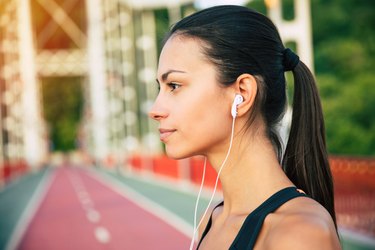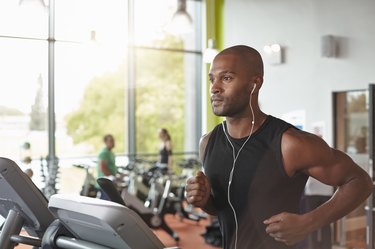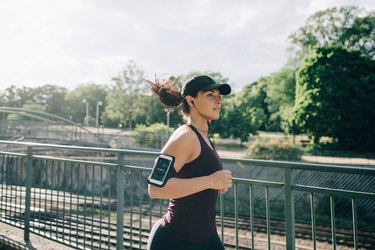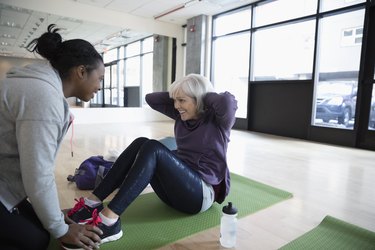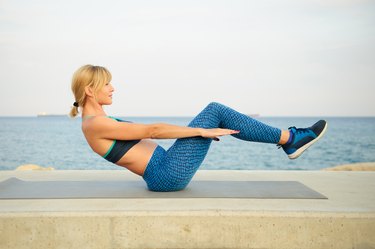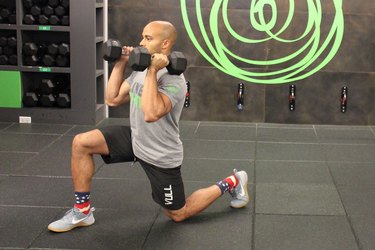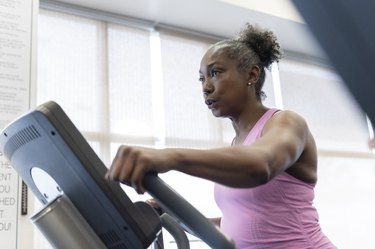
It's not always easy to carve out time for exercise. So when you embark on a sweat session, you want to make sure you're getting the most bang for your workout buck.
Of course, things like getting enough sleep, eating a healthy diet, staying hydrated and wearing appropriate shoes and clothes will all make a difference. But if you're looking for an extra edge, there are things you can do to nudge your performance up a notch.
Video of the Day
Video of the Day
Here are seven science-backed strategies to try.
1. Sip Beet Juice
Move over, sugary sports drink. Deep pink beet juice might help you push the envelope a bit further — with zero added sugar and plenty of nutrients (like vitamin C, folate, iron and potassium).
Women who drank half a glass of beet juice two to three hours before exercising got a temporary boost in their aerobic capacity while working out compared to those who didn't have beet juice, found a small November 2024 study in the American Journal of Physiology-Regulatory, Integrative and Comparative Physiology.
The naturally occurring nitrates in beets can boost levels of nitric oxide in the blood. That in turn may relax blood vessels and encourage increased blood and oxygen flow to muscles, helping you push yourself harder, the study authors say.
2. Pick a Playlist Over a Podcast
While a true crime series might be fascinating, that upbeat playlist is more likely to get you moving. "Music, for me, is the 'magic' in a workout. Beats that get your heart pumping and lyrics that push you through every rep are life-giving," says Lauren Fortener, owner and CEO of Turbo Zone Fitness in Centerville, Ohio.
Research backs this up. People push themselves longer when they crank up the tunes, found an April 2017 study in the International Journal of Physiology, Pathophysiology and Pharmacology.
What's more, any kind of music will get the job done. Fast or slow are both A-OK, as long as you find it energizing, the findings show.
3. Have a Cup of Coffee
Caffeine's energy-boosting effects aren't limited to first thing in the morning or mid-afternoon slumps. It's also been shown to give you an edge during aerobic and strength exercises, concludes a January 2021 paper in the Journal of the International Society of Sports Nutrition.
About 200 mg of caffeine (roughly the amount in 8 to 12 ounces of brewed coffee), drunk about an hour before exercising, can do the trick.
Just keep in mind that you can overdo it on caffeine: The FDA recommends limiting caffeine to 400 mg per day for most healthy adults.
4. Recruit a Workout Buddy
Invite a neighbor to join you for walks, set a standing date with a friend for yoga or join a Facebook group for folks who are looking to improve their strength. Working out with someone — or even just having virtual pals to report back to — makes you want to work harder, found a May 2012 Annals of Behavioral Medicine study.
It all comes down to something called the Kohler effect, which is simply the idea that most of us will push ourselves more when someone else is watching, according to the American Psychology Association.
"Having a workout buddy boosts accountability and motivation. Plus, exercising with a partner makes the experience more enjoyable and fun," says Sydney Yeomans, NASM-CPT, director of fitness for BODY20.
5. Try a Late-Afternoon Workout
Consider lacing up your sneakers after work. Our body temperature increases slightly during the late afternoon, thanks to natural changes to our circadian rhythm, which can "warm up" your muscles to help them work a little harder, concluded an older 2010 review in the Scandinavian Journal of Medicine & Science in Sports.
Afternoon exercise has also been shown to be more effective at stabilizing blood sugar levels compared to morning workouts, per a February 2019 study in Diabetologia.
That said, you should stick with your schedule if an afternoon workout won't work. It's more important to exercise consistently than to try to change your exercise schedule for relatively small gains.
6. Add in Speed Bursts
You'll burn fat and increase your overall fitness in less time with high-intensity interval training (HIIT), where you switch between fast intervals and recovery periods, according to the Harvard T.H. Chan School of Public Health. Compared to exercising at a steady pace, "interval training is about increasing the heart rate and bringing it back down, so experiencing short bursts of intense exercise followed by an active rest," Yeomans explains. And that helps keep your metabolism revved.
If you're new to exercise, adding in some intervals could be as simple as taking a 20-minute walk, boosting your pace for 30 seconds at a time, then slowing down for a minute or two, and repeating for the duration of your workout, notes the Mayo Clinic.
For a more advanced option, try doing 40 seconds of a very challenging exercise (like jump squats or sprinting) paired with 20 seconds of active recovery (like a squat hold or jogging), recommends Yeomans.
7. Take a Warm Soak
Got two or more workouts scheduled close together? Consider taking a hot bath post-exercise session. People who soaked in warm (104 degrees Fahrenheit) water after a 50-minute run performed better on subsequent exercise tests (like jumping and squatting) performed an hour later, compared to those who soaked in cold water or didn't soak at all, found research presented at the November 2024 Integrative Physiology of Exercise conference, hosted by the American Physiological Society.
(It's worth noting here that the research was presented and not published, which typically means it hasn't gone through a rigorous peer-review process. Still, there's little risk in trying a hot bath to see if it makes a difference for you.)
If you're sore, consider adding 1 1/4 cups of Epsom salt to your bath. Some people find it to be a helpful muscle-relaxer and pain-reliever, per the Cleveland Clinic.
- American Journal of Physiology-Regulatory, Integrative and Comparative Physiology: "Preworkout dietary nitrate magnifies training-induced benefits to physical function in late postmenopausal women: a randomized pilot study"
- International Journal of Physiology, Pathophysiology and Pharmacology: "Effect of music tempo on exercise performance and heart rate among young adults"
- Journal of the International Society of Sports Nutrition: "International society of sports nutrition position stand: caffeine and exercise performance"
- Annals of Behavioral Medicine: "Aerobic Exercise Is Promoted when Individual Performance Affects the Group: A Test of the Kohler Motivation Gain Effect"
- American Psychology Association: "The Köhler effect: Motivation gains and losses in real sports groups."
- Scandinavian Journal of Medicine & Science in Sports: "Different effects of heat exposure upon exercise performance in the morning and afternoon"
- Diabetologia: "Afternoon exercise is more efficacious than morning exercise at improving blood glucose levels in individuals with type 2 diabetes: a randomised crossover trial"
- Harvard T.H. Chan School of Public Health: "HIIT (High Intensity Interval Training)"
- Mayo Clinic: "Interval Training for Heart Health"
- American Physiological Society: "Hot Water Immersion Better than Cold to Maintain Exercise Performance"
- Cleveland Clinic: "Should You Take an Epsom Salt Bath?"
